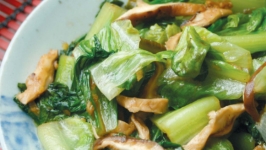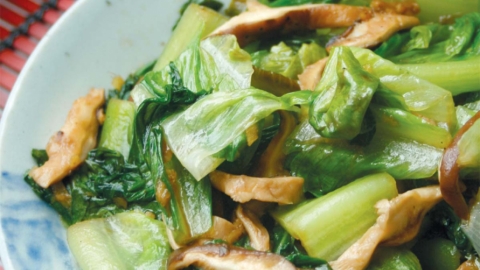Appeasing the Kitchen God
As the Year of the Tiger roars in, many Chinese households seek to please the Kitchen God. According to folklore, this domestic god is a spy for heaven, reporting to his fellow gods all the family’s activities of the prior year. Some Chinese families hang up a poster of the Kitchen God and smear his mouth with honey to guarantee that he only speaks sweet things about them to his fellow gods and good fortune will be bestowed upon the household.
Chinese New Year is a great time to fix up the Kitchen God’s domain, be it in China or New Jersey (and with or without a sticky poster). While you may be considering upgrading a wheezing dishwasher with a quieter one or the old Formica countertop with honed granite, there is something else to keep in mind. The Kitchen God traditionally doesn’t care if this old house was renovated or not, but focuses on the feng shui of his realm.
Feng shui is the ancient Chinese art of creating harmonious surroundings that enhance one’s life and good fortune. And while you may believe in the Kitchen God about as much as you do the Tooth Fairy, the Chinese have long equated a well-laid-out kitchen with a happy and healthy household.
The stove is of particular importance when considering the feng shui of your kitchen. Stoves symbolically create wealth, because the Mandarin word for food (ts’ai) sounds the same as the word for wealth—every time you cook food, you are cooking up prosperity. The Chinese also recognize the relationship between food and our mental and physical health. Feng shui master Lin Yun explained the foodwealth cycle this way: “From food comes our health and effectiveness. If it is well prepared and of good quality, we will do well in the world, [and] earn more money to buy better food.” Unhealthy food can set off a negative chain reaction leading to poor performance, less income and more health problems.
According to the teachings of feng shui, the cook should work in a well-lit, spacious and well-ventilated space, facing the door, able to see anyone entering the kitchen. From this position, you can maintain a calm demeanor as guests and family mill around the kitchen.
Alternatively, facing away from the door may cause you to be startled, making you jumpy, potentially setting off a negative chain reaction affecting your health, relationships, and effectiveness in your endeavors. Ideally, you also want to avoid having the cooktop in a cramped corner, which may restrict your movements, inhibiting and unbalancing your chi (energy). All cooks need elbow room. A stove located on a central island is best, with its spacious countertop and calming view of all who enter.
But what if your kitchen is small and you cook with your back to the door? One solution is to install a mirror behind the cooktop to reflect all goings-on behind you. As a result, you will feel more confident in your surroundings, and your cooking process—and who knows, maybe your life—will go smoother.While a mirror is ideal, an aluminum backsplash will also work. A reflective surface has an additional benefit, too. Since in feng shui households, wealth is associated with the amount of cooking activity on the burners, a mirror that creates the illusion of more burners improves the likelihood of prosperity.
Also, because the stove is symbolic of the family finances, feng shui precepts advise cleaning after each meal and making sure that all burners are in working order, so that positive, untainted food and money (ts’ai) can be cooked up at home. If the burners are coated with grime and grease, family wealth and health may suffer.
Feng shui also teaches that family members’ eating habits can be influenced by where the kitchen is situated in your home. If the kitchen is the first room you see directly into when returning home every day youmay find that the family is excessively food-conscious; simply walking in the front door may elicit a Pavlovian reaction and unexplained hunger. According to the precepts of feng shui, children are the most vulnerable to this layout and may become compulsive eaters. In addition, when friends come for a meal, they may tend to eat and run, finding little interest in your company after the last bite is enjoyed.
Changing the layout of a home is an expensive endeavor, but fear not. For every feng shui problem, there is a feng shui cure. One budget- conscious fix is to mirror the outside of the kitchen door and keep it closed when you leave, or place a folding screen in front of the kitchen entrance to shield guests’ and family members’ eyes from the lure of food upon entering your home, so the focus is on other activities.
Another element that plays a role in the kitchen is color. While red is traditionally considered auspicious, the Chinese also associate it with fire. Use it as an accent color, but avoid having too much or there will be excessive heat in the kitchen and the cook’s temper will constantly boil over. White, on the other hand, is best. A blank canvas, it shows off the vivid reds of tomatoes, greens of string beans and yellows of summer squash.
ENHANCING THE FENG SHUI OFYOUR KITCHEN
Here’s to the Year of the Tiger and cooking up a healthy and prosperous Chinese NewYear with better feng shui in the kitchen. Some simple steps to get you started:
- Always cook facing the door. If your stove is situated against a wall, install a mirror or a reflective surface so you can see what’s happening behind your back.
- Avoid having the stove or kitchen table located under a beam—according to Chinese superstition, this means lent money will not be returned.
- Keep the cooktop clean at all times—grimy burners symbolize income derived from tainted sources.
- Water symbolizes money. (One reason that many Chinese restaurants install fish tanks is to attract water’s moneyproducing energy.) If you have a view of water from your kitchen window, hang a mirror to draw in its reflection.
- Avoid having too much red in your kitchen.The color of fire can make the cook hot-tempered.
- Try to vary the colors of your ingredients when cooking. Though they may taste good, a primarily brown casserole or an all-white menu of mashed potatoes, flounder and white asparagus aren’t as stimulating to the mind as a colorful presentation.
This article first appeared in Edible Jersey's Winter 2011-12 issue.







